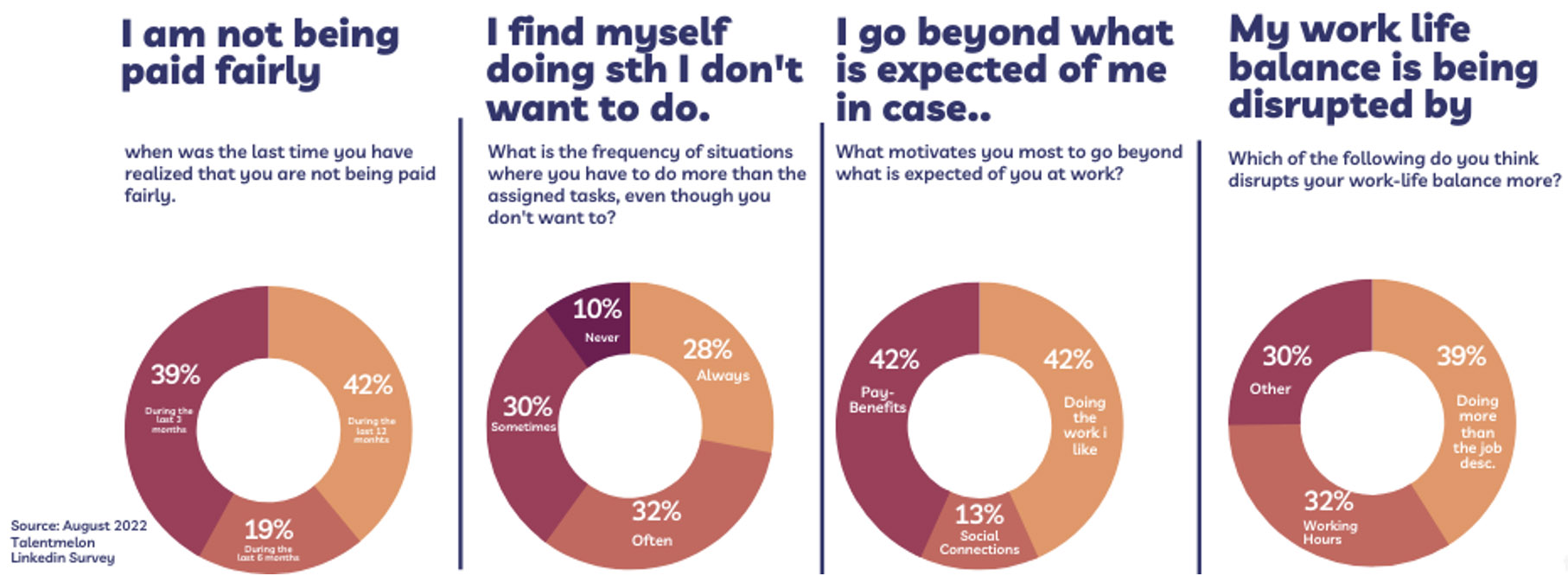The idea of Quiet Quitting has spread around through one of the most-used social media platforms, TikTok. A content creator, named Zaid Khan, shared a video on how he came across this idea and what it brought to his life-work balance. Indeed, despite what the name suggests, it does not mean handing in a resignation paper and carry on with your life. Rather, it refers to focusing on strict job descriptions and not doing anything more than that.
Though it is clear in the workplace for some, many still try to identify the phrase on their own. For instance, to some, while it means setting boundaries about what the output in work will be like to avoid burnouts, and to some others, it is the only way they achieve their life goals than their career goals.
What is happening in the world?
According to a survey done by 1000 American employees, the results show that roughly a quarter, 21% of Americans state themselves as Quiet Quitters and only 24% of them believe that their managers have their best interest at heart when it comes to work. Another report released by the American Psychological Association in January describes this situation Mr. Khan, and many experience in their work lives, as burnout and stress and states that such kind of hitches has hit all-time highs across industries during the pandemic.
What is the situation in Turkey?
In a country like Turkey with high inflation and impeded life standards, employers should be much more sensitive in understanding the individualized support their employees need.
With this burning question at mind and to understand situation in Turkey, Melon published four different LinkedIn Survey questions related to Quiet Quitting. Here are the few insights from those questions:
- 70% of the participants claim realizing they were not fairly compensated for their efforts during the last 6 months.
- 71% of the participants think that long working hours or extra works are the main reasons of disruption of work-life balance
- While 28% of the participants always find themselves doing tasks they don't want, 62% state they often or sometimes find themselves doing tasks they don't want. There is only 10% of participants who are never asked to do a task they don't want.
- While %42 of the participants think “loving the job they do” is the most critical factor to go beyond what is expected from them, 43% of them think “being fairly compensated and rewarded” is the most critical motivating factor.

Did these four questions help us find out what really matters to people to do their best? What do they really care about? To be at their best selves at work, what do they need from their leaders?
Does your leader care about you?
A Good Leader = Gateway to Balanced Life= BeingAt Your Best At Work
With our mini survey questions series on LinkedIn, we came to the conclusion that people need an environment of trust, phycological safety, financial safety and better work-life balance supported by their leaders, knowing that it will be challenging for leaders to be able to provide them all, developing a personalized support tools for everyone is the key.
Call on Leaders to act: Reach out to your people!
· Make sure there is no perception of unfairness in the experiences of your team members.
· Make sure to have regular/quarterly 1:1s focused on individual growth needs with every team member. t
· Make sure your people feel supported in their roles. Understand if there is any unrealistic expectation from the role.
· Make sure everyone knows clearly what you are trying to achieve and what is expected from their roles.
· Don’t be afraid to talk about your team members' financial well-being problems. Understand these challenges and proactively support them by doing the best you can.
· Make sure you have the right workforce balance in the team.
If you are curious about our leadership development services, contact us at [email protected].








